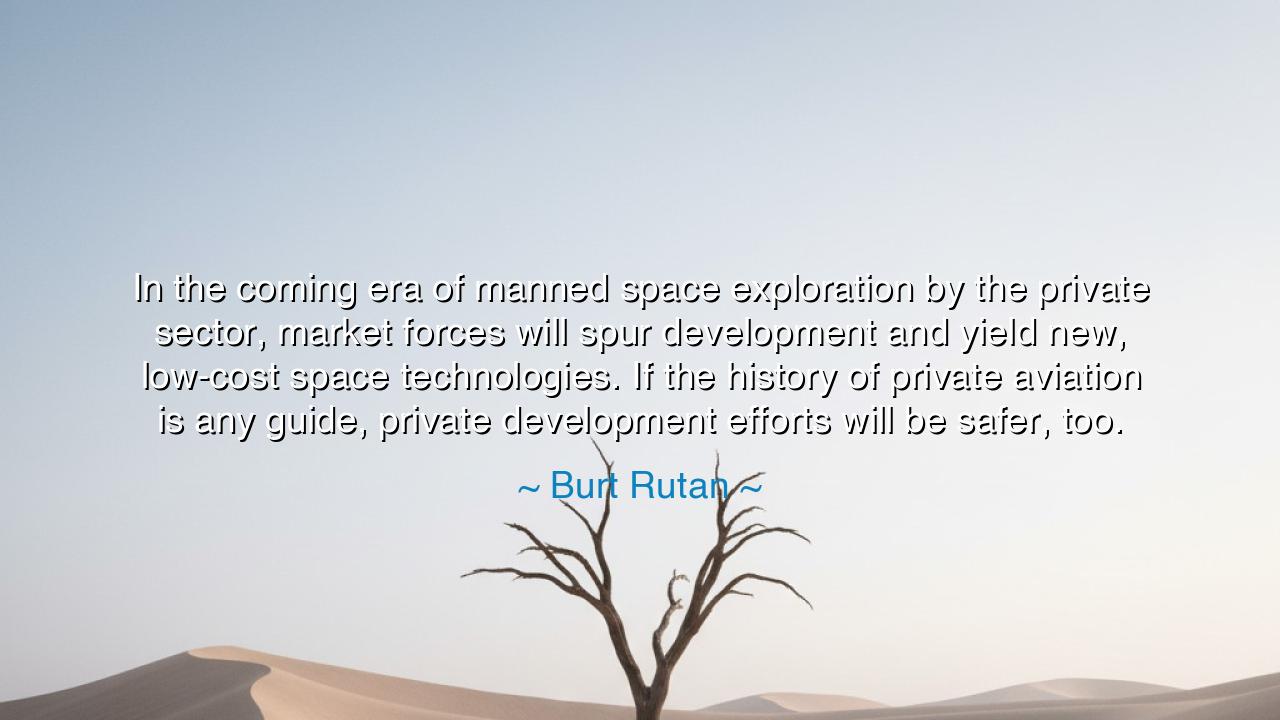
In the coming era of manned space exploration by the private
In the coming era of manned space exploration by the private sector, market forces will spur development and yield new, low-cost space technologies. If the history of private aviation is any guide, private development efforts will be safer, too.






In the words of Burt Rutan, the visionary engineer whose hands shaped the dreams of flight and space, there resounds both prophecy and conviction: “In the coming era of manned space exploration by the private sector, market forces will spur development and yield new, low-cost space technologies. If the history of private aviation is any guide, private development efforts will be safer, too.” These words do not merely forecast a future of technology; they declare the dawn of a new age — the age of private exploration, when the fire of discovery, once the province of nations, would pass into the hands of individuals and enterprises. Rutan, ever the pioneer, reminds us that freedom and innovation are bound not by bureaucracy, but by the courage and creativity of those who dare to dream beyond Earth’s horizon.
The origin of this insight lies in Rutan’s lifelong devotion to flight — from the sleek curves of his aircraft designs to his crowning triumph, SpaceShipOne, the first privately built vehicle to carry humans into space. For centuries, the heavens had been the realm of myth and empire, then later, of governments locked in the Cold War’s celestial race. But Rutan saw a greater destiny — that the future of space exploration would not belong solely to the state, but to humankind itself, guided by market forces and the restless ingenuity of the individual mind. He believed that when invention is liberated from the weight of bureaucracy, it grows leaner, swifter, and safer.
To understand the depth of his vision, one must look to the history of private aviation, to which Rutan himself alludes. In the early days of flight, after the Wright brothers first rose into the sky, the world’s governments were slow to recognize the potential of aviation. It was not the kings or generals, but the inventors, entrepreneurs, and dreamers who refined flight — men like Glenn Curtiss and William Boeing, who transformed fragile wooden frames into robust machines that connected continents. The same market forces that drove competition also drove innovation. As private hands experimented, improved, and refined, the art of flying became not only more efficient, but safer — proving Rutan’s belief that freedom of enterprise fuels the evolution of technology far more rapidly than command or control.
Rutan’s SpaceShipOne, launched in 2004, embodied this philosophy. It was not built by a government agency with vast resources, but by a small team driven by curiosity and will. Its success broke open the heavens for the private sector, proving that space need not remain a playground of nations, but could become the next great frontier of human enterprise. Just as private aviation gave birth to the modern airline industry, Rutan envisioned a world where private exploration would yield new technologies — not just for astronauts, but for all humanity. He saw that when individuals are free to explore, the cost of progress falls, the pace of discovery rises, and the spirit of adventure is renewed.
Yet his words carry more than technological insight — they hold a moral and philosophical truth. Rutan believed that the pioneering spirit must never be monopolized. When discovery becomes confined to governments, it risks stagnation; when it belongs to the many, it flourishes. Innovation is the child of curiosity, not conformity. The market — when guided by vision and ethics — becomes a crucible where necessity and imagination meet, birthing the very tools that push civilization forward. Just as the compass, the steam engine, and the airplane were born in private workshops before transforming empires, so too will the next great leap — the colonization of the stars — emerge from the hands of dreamers and builders, not committees and regulations.
Consider, too, the symbolism of SpaceShipOne: a vessel of light metal, lifted not by the wealth of nations, but by the ambition of minds that refused to wait. Its ascent was a message to all humanity — that exploration is not a privilege of power, but a birthright of the human spirit. From that small craft’s flame was kindled the rise of companies like SpaceX, Blue Origin, and others who now chase the heavens with renewed fervor. These are the heirs of Rutan’s creed — that when freedom and innovation intertwine, humanity takes flight.
And so, my listener, let this be your lesson: do not wait for permission to explore. Whether your frontier is in science, art, or the soul, remember that progress is not the gift of the powerful, but the labor of the bold. The market of ideas — like the market of innovation — rewards those who dare to create. Be not content to dwell within the safe boundaries others have built; forge your own. For as Rutan teaches, the greatest revolutions are not decreed from above, but discovered from below — where imagination meets opportunity.
Thus, let the wisdom of Burt Rutan endure: that the future belongs to the pioneers, and that the true power of exploration lies not in the machinery of government, but in the untamed heart of humanity. As private minds and hands once conquered the skies, so too will they claim the stars — not through conquest, but through creation. And when they do, the heavens will no longer belong to the few, but to all who dare to look upward and say, “Why not me?”






AAdministratorAdministrator
Welcome, honored guests. Please leave a comment, we will respond soon